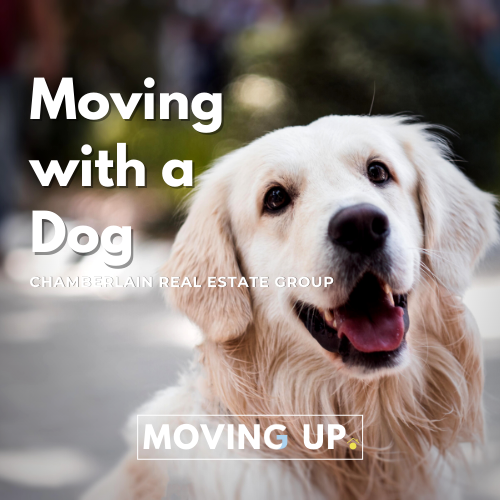Moving with a Dog
 Nothing beats the feeling of going home and being welcomed with playful hugs from your dog. But what if you moved to a new place and all of a sudden your dog’s attitude changed?
Nothing beats the feeling of going home and being welcomed with playful hugs from your dog. But what if you moved to a new place and all of a sudden your dog’s attitude changed?
We invited Mary Paulette McDonogh, an animal communicator based in Calgary, Alberta, to share how dogs respond when their owners move to a new home. Continue reading if you want to understand the changes in your dog’s behaviour and know how to help them transition.
The preparation you need to do before you move varies depending on your dog’s breed and how they handle anxieties. If you have a really anxious dog, your approach will be a lot different from a relaxed dog. Obviously, an anxious dog needs more attention and time, and the low-key ones will be easier to handle.
Communicate with your Dog
Mary Paulette always asks her clients to talk to their animals as if they are toddlers. Owners need to communicate with their pets and let them know what is happening. It may sound silly, but most of her clients who started implementing that saw the difference that it makes because dogs can really understand what people say.
She further explained that everything is energy. Everything and everyone has different types of energy or vibrations. If you exude joyful energy at home, then most likely, your pet will be cheerful as well. Dogs are sensitive to human emotions too. They can sense when someone is uneasy or calm, and they instantly respond to that.
Transitioning to a New Home
Your dog might be cool as a cucumber before you move, but you might be shocked with the changes in their ways once you move into the new place. There might be residual energy that remains in your new house that could affect your pet.
For example, if you ever had the feeling that somebody was watching you, then you look over, and there is indeed somebody watching you! Or you go somewhere you have never been before, but you don’t like the vibe of the place; the exact same thing happens to animals.
When you move, your pet will be forced to deal with different energy, like the energy in the new house, the energetic connections they have with your family members, and their own. All of this might cause them to feel homesick and miss their old routine. Having a routine is vital to dogs. They really need predictability, especially the anxious ones.
Dogs Take Time to Adjust
There are many variables for the length of time dogs adjust to a new home, but it takes about three weeks on average.
It will be beneficial to your pet if you can prepare them for the move. Talk to your dog and explain that you will be moving and they will have a new home too. Explain that there will be changes in the smell, environment and everything.
If you have somebody that you can leave your animal with for a day or two, especially on moving day, that would be awesome! If there is no one to look after them, you can set them up in a room with their bed and all of their familiar items to make them feel comfortable.
Another thing that can give your dog warmth of assurance is helping them keep an eye on you while the move is happening. If you place them inside a room, leave the door open and just put a baby gate. They will stay there even if they are usually a jumper because they will see everything going on.
Moving is Stressful for Dogs
Dogs feel the same amount of stress as humans do. Although they tend to hide their anxiety, it manifests in many different ways. Since they are new to the place and everything is uncertain, they feel an influx of emotions and are also affected by their owner’s emotions.
Some of the most obvious signs that a dog is depressed are when they start soiling in the house and barking or chewing. You will also notice that they will stick to you like glue to ease their emotions.
Keep an eye out for if your dog starts excessively licking as if they are grooming themselves like a cat. They may also start gnawing at their paws if they are uneasy.
For really stoic dogs, observe if they start losing hair. Having low energy to go out on walks and appetite changes are not so good as well. Make sure that they always drink enough water because it is not good for animals to get dehydrated.
As humans, we have five love languages; animals have five ways to experience the world. Often dog owners assume that it is just smell, but that’s not always the case. Sometimes they also use their hearing or sight on top of the smell.
Since smell is really important to them, remember that you should not wash any of their belongings before moving. Having something with a familiar scent will help them transition.
If you want to know more about dealing with your pets when you move to a new home, you can reach Mary Paulette McDonoghon her website, www.marypaulette.com. You can also follow her social accounts on Facebook, Connect with Mary Paulette, and on Instagram, @mary_paulette_mcdonogh.
Posted by Jared Chamberlain on
Leave A Comment